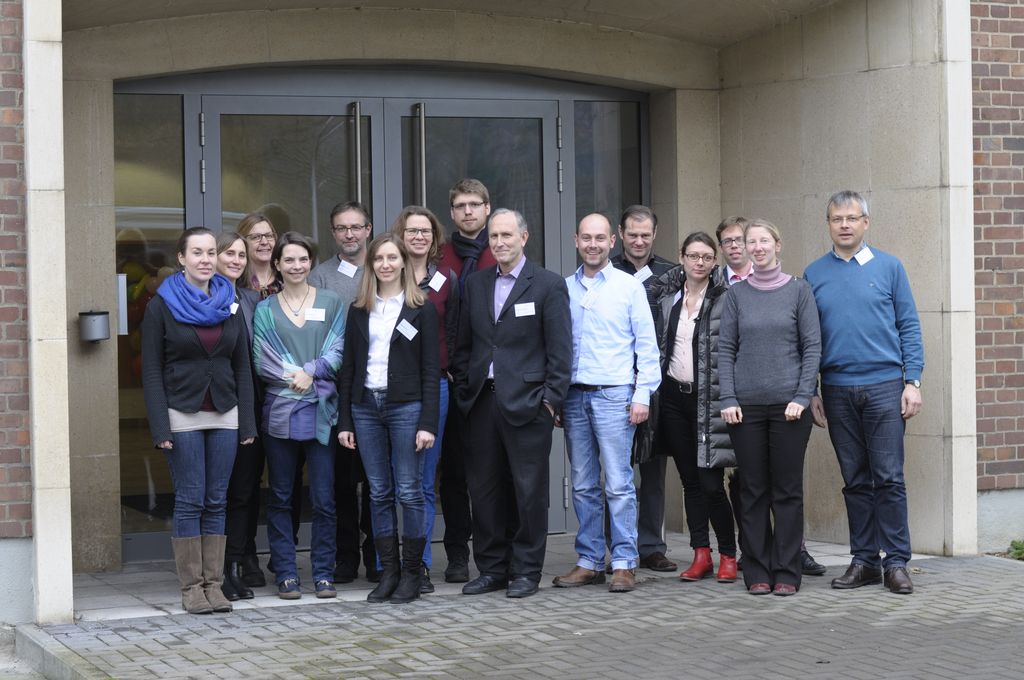Project
Scenarios of the Bio Economy 2050 - Potentials, trade-offs, solution strategies
Bio Economy 2050: Potentials, trade-offs, solution strategies
The transition of our present petrol-based to a more sustainable bio-based economy requires broad societal acceptance. For the successful implementation of the bio economy strategy potential trade-offs have to be identified in advance, and solution strategies for stakeholders and the civil society have to be developed.
Background and Objective
The bio economy encompasses all sectors of the economy and their related services that produce, prepare and process, use and trade with renewable biological resources. Bio-based economic activities are supposed to substantially contribute to an increasing independence from fossil resources, to reduce negative impacts on environment and climate, but also to ensure food security.
The research project aims at developing several scenarios of the change to an bio-based economy in 2050 and at presenting acceptable transition paths. Thereby, (political) responsibilities, options for action and control devices will be identified.
Target Group
Policy, Industry, Population
Approach
We develop practicable transition paths to a bio-based economy on the basis of the current use of land and resources as well as the availability and usage of biomass. The increasing demand for biogenic resources and associated effects (e.g. effects on quantities, prices and trade, changes of CO2 emissions, changes of landscape, labour market effects) will be considered in the analyses to reveal the potentials of the bio economy as well as limitations and areas of conflicts. We analyse measures to mitigate conflicts (e.g. yield and efficiency improvement, cascade use, use of residual and waste materials) and evaluate them from the society's point of view. We discus trade-offs derived from modelling process with stakeholders and civil society in an iterative procedure to identify solution strategies and options of action.
The research project follows a transdisciplinary approach: Model-based analyses of different transition pathways to a bio-based economy will be combined with empirical social research methods on acceptance.
Data and Methods
Due to the transdisciplinarity of the project we use different research methods on the basis of various data sources.
To develop the scenarios of the "Bio Economy 2050" the Story and Simulation (SAS) approach will be applied which combines qualitative, narrative descriptions and quantitative, model-based numerical information. This approach will be extended, for instance through the application of innovative methods from the fields of fuzzy set theory and system analysis. As part of the scenario panels, experts and stakeholders play key roles in the process of scenario development.
On the basis of models the ecological and economic impacts of the bio economy scenarios will be quantified. For this purpose, we establish a modelling framework combining such well-tested models as LandSHIFT, BENSIM, GFPM and MAGNET.
To our knowledge, the systematic integration of the civil society in the process of scenario development has never been realized before. We develop an appropriate instrument to communicate the complex model results to permit the scenario assessment through (members of) the civil society. For this purpose, primary data will be collected by the means of qualitative and quantitative methods of empirical social research. The results will be passed back into the scenario process, so that it will consistently undergo feedbacks that represents a real dialogue-process.
Our Research Questions
- Which societal and political processes have to take place to stimulate the transition to a more sustainable use of biomass in production ans consumption?
- What are the potential elements of a sustainable "Bio-Economy 2050" in Germany?
- Will the global availability of biomass restrain the transformation? How will the international biomass trade develop? Which contribution to climate protection can be expected?
- Which influence will climate change have on biomass production, water supply, water quality and, hence, on the "Bio-Economy 2050"?
- Are there conflicts between an increasing demand for biomass and other objectives like climate protection and biodiversity? Which solution strategies can be suggested?
- How do stakeholders and society perceive these trade-offs, and, which consequences have to be expected for the acceptability of transformation processes?
- How must transformation processes be shaped to fulfill societal requirements and expectations?
- Which role should policy play in shaping of a societal accepted transition to a "Bio-Economy 2050"?
Results
- Indicator system for Assessing the Sustainability of the Bioeconomy
- First results how the society assesses the bio economy
- Summary of the BEPASO results
Links and Downloads
Here you can find current developments in BEPASO.
Thünen-Contact

Involved Thünen-Partners
Involved external Thünen-Partners
- Deutsches Biomasseforschungszentrum (DBFZ)
(Leipzig, Deutschland) - Center for Environmental Systems Research (CESR)
(Kassel, Deutschland) - Nova-Institut für politische und ökologische Innovation GmbH
(Hürth, Deutschland) - Helmholtz-Zentrum für Umweltforschung (UFZ)
(Leipzig, Deutschland)
Funding Body
-
Federal Ministry of Research, Technology and Space (BMFTR)
(national, öffentlich)
Duration
1.2017 - 2.2020
Publications to the project
- 0
Morland C, Schier F, Weimar H, Dieter M (2022) Forest-based bioeconomy pathways with emerging lignocellulosic products: A modelling approach : [paper for] XV World Forestry Congress, Coex, Soul, Republic of Korea, 2-6 May 2022. 7 p
- 1
Szarka N, Haufe H, Lange N, Schier F, Weimar H, Banse M, Sturm V, Dammer L, Piotrowski S, Thrän D (2021) Biomass flow in bioeconomy: Overview for Germany. Renewable Sustainable Energy Rev 150:111449, DOI:10.1016/j.rser.2021.111449
- 2
Kallio AMI, Schier F (2021) Editorial for the special issue "Towards the bioeconomy: The role of traditional and emerging products and supporting actions". Forest Pol Econ 131:102573, DOI:10.1016/j.forpol.2021.102573
- 3
Schier F, Morland C, Dieter M, Weimar H (2021) Estimating supply and demand elasticities of dissolving pulp, lignocellulose-based chemical derivatives and textile fibres in an emerging forest-based bioeconomy. Forest Pol Econ 126:102422, DOI:10.1016/j.forpol.2021.102422
- 4
Sturm V, Banse M (2021) Transition paths towards a bio-based economy in Germany: A model-based analysis. Biomass Bioenergy 148:106002, DOI:10.1016/j.biombioe.2021.106002
- 5
Banse M, Zander K, Babayan T, Bringezu S, Dammer L, Egenolf V, Göpel J, Haufe H, Hempel C, Hüfner R, Millinger M, Morland C, Musonda F, Partanen A, Piotrowski S, Schaldach R, Schier F, Sturm V, Weimar H, Will S, et al (2020) Eine biobasierte Zukunft in Deutschland - Szenarien und gesellschaftliche Herausforderungen. Braunschweig: Johann Heinrich von Thünen-Institut, 48 p
- 6
Morland C, Schier F (2020) Modelling bioeconomy scenario pathways for the forest products markets with emerging lignocellulosic products. Sustainability 12(24):10540, DOI:10.3390/su122410540
- 7
Hempel C, Will S, Zander K (2019) Bioökonomie aus Sicht der Bevölkerung. Braunschweig: Johann Heinrich von Thünen-Institut, 55 p, Thünen Working Paper 115, DOI:10.3220/WP1545134625000
- 8
Hempel C, Will S, Zander K (2019) Societal perspectives on a bio-economy in Germany: An explorative study using Q methodology. Int J Food Syst Dynam 10(1):21-37, DOI:10.18461/ijfsd.v10i1.02
- 9
Hempel C, Will S (2018) Bio-economy in Germany: Insights into public perceptions. In: Preserving ecosystem services via sustainable agro-food chains. Chania: EAAE ; MAICh, p 144
- 10
Will S, Hempel C (2018) Bioökonomie in Deutschland aus Sicht der Bevölkerung. In: Methoden für eine evidenzbasierte Agrarpolitik - Erfahrungen, Bedarf und Entwicklungen : Tagungsband 2018. Wien: BOKU, pp 125-126
- 11
Hempel C, Will S, Zander K (2018) Societal perspectives on a bio-economy in Germany: An explorative study using Q methodology. In: Deiters J, Rickert U, Schiefer G (eds) Proceedings in System Dynamics and Innovation in Food Networks 2018 : presentations of the 12th European International Forum on System Dynamics and Innovation in Food Networks, February 05-09, 2018, Innsbruck/Igls. pp 241-260, DOI:10.18461/pfsd.2018.1818







